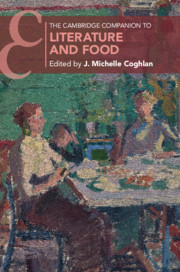Book contents
- The Cambridge Companion to Literature and Food
- The Cambridge Companion to Literature and Food
- Copyright page
- Contents
- Illustrations
- Contributors
- Acknowledgments
- Chronology of Major Works and Events
- Introduction: The Literature of Food
- 1 Medieval Feasts
- 2 The Art of Early Modern Cookery
- 3 The Romantic Revolution in Taste
- 4 The Matter of Early American Taste
- 5 The Culinary Landscape of Victorian Literature
- 6 Modernism and Gastronomy
- 7 Cold War Cooking
- 8 Farm Horror in the Twentieth Century
- 9 Queering the Cookbook
- 10 Guilty Pleasures in Children’s Literature
- 11 Postcolonial Tastes
- 12 Black Power in the Kitchen
- 13 Farmworker Activism
- 14 Digesting Asian America
- 15 Postcolonial Foodways in Contemporary African Literature
- 16 Blogging Food, Performing Gender
- Selected Guide to Further Reading
- Index
- Cambridge Companions to Literature
12 - Black Power in the Kitchen
Published online by Cambridge University Press: 17 March 2020
- The Cambridge Companion to Literature and Food
- The Cambridge Companion to Literature and Food
- Copyright page
- Contents
- Illustrations
- Contributors
- Acknowledgments
- Chronology of Major Works and Events
- Introduction: The Literature of Food
- 1 Medieval Feasts
- 2 The Art of Early Modern Cookery
- 3 The Romantic Revolution in Taste
- 4 The Matter of Early American Taste
- 5 The Culinary Landscape of Victorian Literature
- 6 Modernism and Gastronomy
- 7 Cold War Cooking
- 8 Farm Horror in the Twentieth Century
- 9 Queering the Cookbook
- 10 Guilty Pleasures in Children’s Literature
- 11 Postcolonial Tastes
- 12 Black Power in the Kitchen
- 13 Farmworker Activism
- 14 Digesting Asian America
- 15 Postcolonial Foodways in Contemporary African Literature
- 16 Blogging Food, Performing Gender
- Selected Guide to Further Reading
- Index
- Cambridge Companions to Literature
Summary
“Black Power in the Kitchen” excavates African American women’s culinary writing, which has been relegated to the margins of the US and African American literary canon. This chapter provides an overview of key developments in the black female-authored cookbook from the nineteenth to the twentieth century. It examines early cookbooks that exploited the “Jemima Code” for their authors’ individual advancement, the community cookbook that served the larger goals of racial uplift, and the experimental and diasporic aesthetic of soul food writing. Authors under discussion include Malinda Russell, Abby Fisher, Freda DeKnight, and Vertamae Smart-Grosvenor, among others. What emerges from this account is a new understanding of how black feminist politics underwrites these literary texts, and opens up possibilities for understanding how these texts, in turn, bare on wider aesthetic practices in the United States – specifically, by reconfiguring the kitchen table as a writing table.
Keywords
- Type
- Chapter
- Information
- The Cambridge Companion to Literature and Food , pp. 182 - 196Publisher: Cambridge University PressPrint publication year: 2020
- 1
- Cited by

